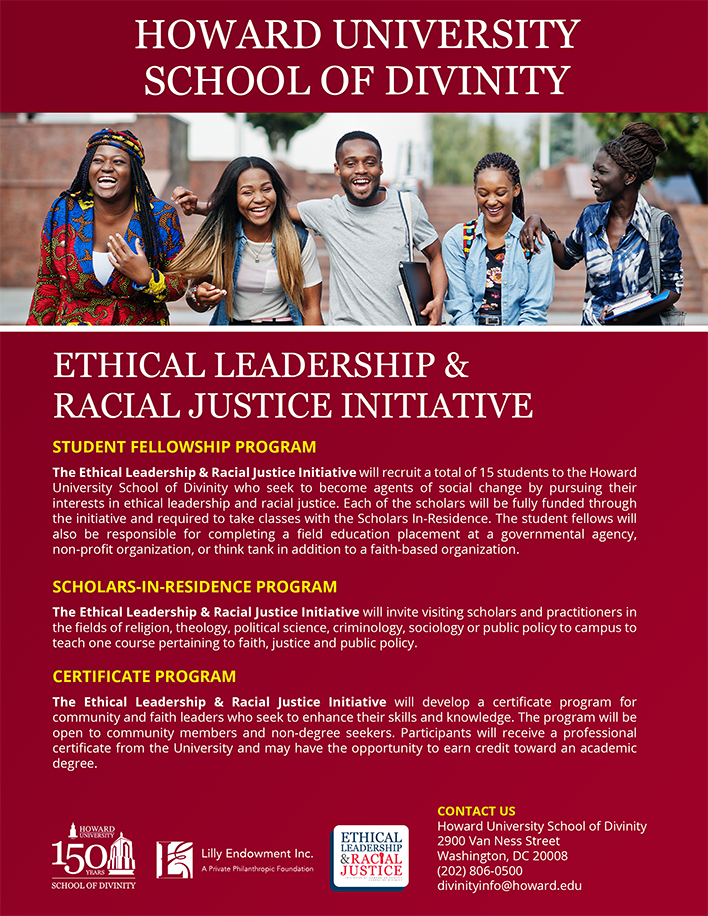Ethical Leadership and Racial Justice Initiative
Ethical Leadership and Racial Justice Initiative

Ethical Leadership & Racial Justice Initiative
The Ethical Leadership & Racial Justice Initiative is a direct response to recent uprisings of social unrest and Black Lives Matter protests throughout the nation which continue to challenge systematic injustice and inequality in the United States. As a graduate theological and professional institution that prepares academic and religious leaders to serve the Church and society, we believe that religion and theological discourse at its best is actualized when it propels social change for the common good. Through this initiative we seek to bridge the gap between public policy and faith centered ethical reasoning by inviting visiting scholars to the campus community and developing a certificate program to better equip community and faith leaders. Most importantly, this initiative aims to support students in their quest to use their theological training to solve the nation’s socio-political, economic and moral crises by developing a fellowship program for students whose academic interest align with ethical leadership and racial justice. The 3-year initiative will give participants first- hand exposure to governmental agencies, non-profit organizations, think-tanks, and faith-based communities. In partnership with the Howard University School of Law, College of Arts & Sciences and College of Medicine, Ronald Walters Center for Public Policy & Thurgood Marshall Center for Civil Rights, the Ethical Leadership & Racial Justice Initiative aims to become a first-class interdisciplinary model for theological institutions.
The Ethical Leadership & Racial Justice Initiative has the following goals and objectives:
1. To fully fund a cohort of graduate students interested in pursuing theological education through the lens of ethical leadership and racial justice.
2. To expose students and the entire HUSD community to visiting scholars and practitioners as both an enhancement to the traditional theological curriculum and to expand the parameters of understanding ethical leadership and racial justice within theological education.
3. To engage the local community, non-degree students, and faith bodies with sustained national conversations about ethical leadership and racial justice, primarily through the means of online events, programs, and webinars, as well as a certificate program of the same theme.
Student Fellowship Program
The Ethical Leadership & Racial Justice Initiative will recruit a total of 15 students to the Howard University School of Divinity who seek to become agents of social change by pursuing their interests in ethical leadership and racial justice. Each of the scholars will be fully funded through the initiative and required to take classes with the Scholars In-Residence. The student fellows will also be responsible for completing a field education placement at a governmental agency, non-profit organization, or think tank in addition to a faith-based organization (field education).
Scholars In-Residence Program
The Ethical Leadership & Racial Justice Initiative will invite a visiting scholar or practitioner in the field religion, theology, political science, criminology, sociology or public policy to campus to teach one course pertaining to faith, justice and public policy. The course will be designed by the visiting scholar or practitioner and will be open to all students. All Scholars In-Residence will also be asked to give a school- wide lecture and participate in round-table discussions on their topic of choice related to the mission of the initiative.
Certificate Program
The Ethical Leadership & Racial Justice Initiative will develop a certificate program for community and faith leaders who seek to enhance their skills. The program will be open to all Howard University students and non-degree seekers. The certificate program will be launched in year two of the initiative and will be housed at an offsite community venue that can accommodate the needs of the program while fostering a sense of grassroots community building. Participants will receive an accredited certificate from the University and may have the opportunity to earn credit toward an academic degree.
